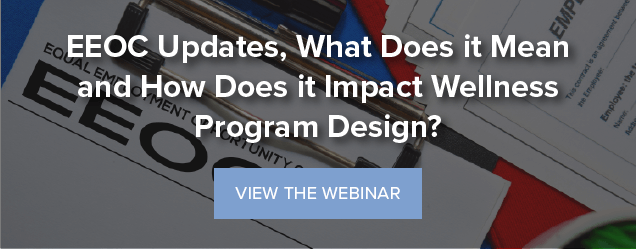
In May 2021, updated EEOC vaccine guidance was published to help employers navigate how to address COVID in the workplace and their limitations for promoting vaccination.
Given the sensitive nature of this subject, we reached out to Barbara Zabawa, founder and president of the Center for Health and Wellness Law, LLC, whose article, “Are Wellness Practitioners Subject to OSHA’s COVID-19 Healthcare Emergency Temporary Standards (ETS)?” provides a thorough legal assessment of the guidelines.
Zabawa addressed questions related to incentives, mandates, and other wellness-related topics that our clients are anxious to answer.
What Role Can Employers Play in Getting Employees Vaccinated?
Employers are allowed to both incent and require employee vaccinations, but they need to use caution in navigating both options.
No Limit to Incentives If Administered By a Third Party
If employers ask employees to go to their doctor's office, a local pharmacy, or the public health department to get vaccinated, there is no limit to incentives. In fact, they can create a corporate challenge where employees log into their wellness portal when they are vaccinated and upload an image or scan of their vaccination card.
Incentives can be any range of items or benefits—from paid time off to money to gift cards.
Related Reading: Creative Wellness Incentives for Companies on a Budget
On-Site Vaccinations Are More Complicated
It gets a bit dicey when an employer opts to provide vaccinations on-site or be involved in administering the vaccine in some way. Every person who gets vaccinated must answer pre-screening questions, some of which are disability-related and subject to Americans with Disabilities Act guidelines.
“You have to be cognizant of the fact that you can't force people to answer those types of questions,” says Zabawa. “If you're going to incentivize vaccinations, it can't feel coercive.”
The other option employers have is to require vaccinations.
Can Employers Require Vaccinations?
Anyone who’s been paying attention to the news lately has heard about the Houston Methodist Hospital lawsuit. Hospital employees were told to get the COVID vaccine or find another job.
And while most of the employees did get vaccinated, a group of employees sued the hospital.
In the end, the judge tossed the lawsuit out, specifically noting that it wasn’t mandated, setting a precedent for employers who want to require vaccination. Afterward, some of the employees in question did agree to be vaccinated, but many lost their jobs.
The EEOC has indicated that employers can give their employees a similar choice—if they don't want to get the vaccine, they know what the consequence is.
Assume That Some Employees Will Not Be Vaccinated for Valid Reasons
Employers do, however, have to allow for the reality that some of their employees are unable to get the vaccine because of an underlying disability or religious belief. Alternate arrangements for those employees have to be made, or your company will be in violation of Title VII and ADA regulations.
“In some cases, the courts have cast doubt and upheld the employers' requirement that employees get the vaccine,” Zabawa highlights. “But, if someone says they don't want to get the vaccine because of a religious belief, you should ask for information to back up the assertion and assume it's sincerely held.”
Related Reading: Corporate Wellness Program Regulations: Are You Compliant?
How Can Employers Leverage Wellness Programs to Increase Vaccinations?
The Houston hospital case shone a light on the underlying beliefs and concerns that some people have about the COVID vaccine. To date, only about half of the U.S. population has been vaccinated. The others? Some might be uncertain or nervous but are keeping an open mind, while others are adamantly against the vaccine altogether.
To persuade these people will be no easy task, especially with all the misinformation available online and by word-of-mouth.
“You're dealing with people who have beliefs about the vaccine, and you need to address any beliefs that are based on political or uninformed opinions,” says Zabawa. “A lot of education needs to be put out there to try to address the underlying concerns that are causing people to not get the vaccine.”
What does that mean for employers and their corporate wellness programs?
Get Creative With Your Wellness Programming
If combatting misinformation were easy, it would already have happened. So, no single message is going to transform the thinking of this subset of employees.
However, a number of your wellness program offerings can be leveraged to help deliver factual information and, hopefully, persuade at least some of the vaccine holdouts in your company.
Consider implementing these options:
- Survey unvaccinated employees to find out why they haven’t been vaccinated so you know what information to counteract.
- Find out what incentives might work for those employees and determine if they can be offered in a challenge.
- Dedicate a section of your wellness portal and weekly messaging to share the most updated and accurate clinical information about the long-term effects of COVID.
- Add a section to your learning library that explains FDA authorization for emergency use versus the standard vaccination approval process.
- Encourage coaching or virtual counseling services for employees who are anxious about the vaccine and its perceived effects.
Another good idea is for leadership to model the desired behavior. When vaccine-hesitant employees see their vaccinated coworkers and managers suffering no lasting ill-effects, it helps counteract some of the messaging they’re receiving elsewhere.
Employers have a heavy task ahead of them when it comes to employee vaccinations, but the recent EEOC guidelines offer hope that more persuasive measures will be supported and in compliance. If your organization is struggling with how to leverage your wellness program to increase employee vaccinations, WellRight can help.




